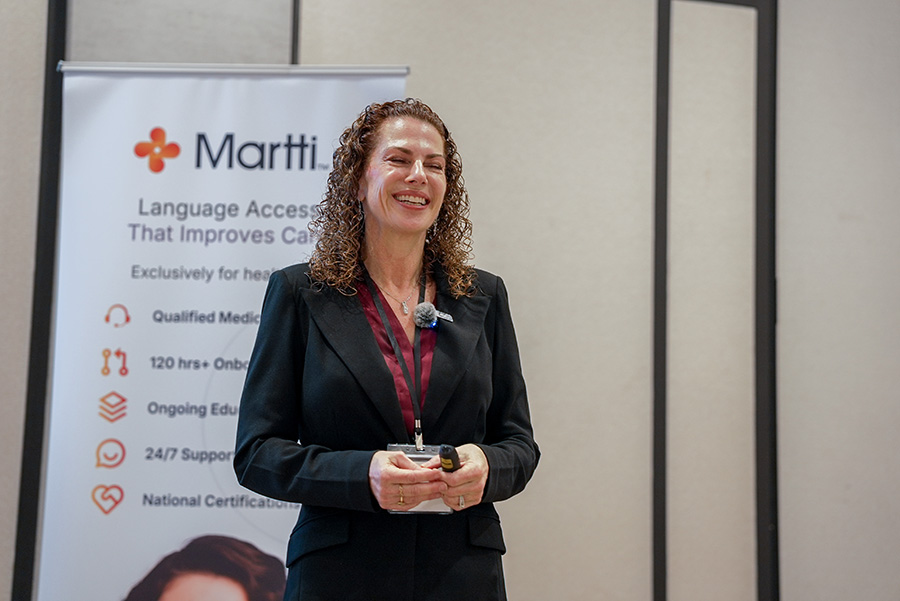May 27, 2025
Building Connections Through the 2025 Language Access Leadership Symposium - Atlanta


Language access plays a vital role in delivering equitable healthcare. However, addressing communication gaps presents ongoing and complex challenges. The 2025 Language Access Leadership Symposium - Atlanta was created to tackle these issues by bringing together healthcare leaders committed to enhancing language access and ensuring health equity.
This matters now more than ever. Healthcare is changing at a rapid pace – and now is the time for greater collaboration. Whether this change is being driven by changing immigration trends, public policy, or technology advancements, we can all learn from one another’s experiences.
And while this Symposium was only one step toward that greater goal, we know that together, we will continue to improve access to care.
If you’re a healthcare professional passionate about improving language access and outcomes for culturally and linguistically diverse populations, learn what was discussed at the Symposium and how language access experts are working together to advance our industry.
Key Presentations Shaping the Conversation
The Symposium offered a series of thought-provoking presentations from leaders across the language services field. Here’s a breakdown of each session:
Exploring the Evolving Landscape of Language Access
Speakers: Maureen Huber (Equiti CEO) and Dr. Tatiana Cestari (Director of Language Service Advocacy)
With insights into how language access is transforming the healthcare landscape, this session explored the ripple effects of language services on patient outcomes, health equity, and clinical metrics, providing a clear vision for where the industry is headed and helpful strategies to get there.
Language Advocacy and Immigration Trends

Speaker: Sonal Shah (Managing Attorney and Partner, Antonini & Cohen Immigration Law)
Shah brought attention to how shifting immigration trends are influencing the demand for language services in healthcare. Her session shed light on how language advocacy must evolve in tandem with demographic changes and how language service leaders can use multiple sources to forecast those changes.
Multimodal Access for Diverse Patient Needs

Speaker: Debbie Lesser (Director of Language Access, Wellstar Health System)
Lesser shared strategies for delivering multimodal language access, emphasizing the importance of adapting services to support hearing, Deaf, and hard of hearing patients across various care settings. Her practical approach offered attendees valuable ideas for their own initiatives.
Pediatric Language Access

Speakers: Alison Arévalo-Amador (Manager of Interpreting and Translation Services, Children’s Healthcare of Atlanta) and Lucy Goldberg (Child Life Clinical Supervisor, Children’s Healthcare of Atlanta)
Arévalo-Amador and Goldberg highlighted how interpreters and Child Life Specialists team up to address the highly sensitive and complex needs of pediatric patients and their families. They emphasized the importance of coordination, flexibility, and cultural competency in high-stakes medical environments.
Hospitality Meets Healthcare

Speaker: Julio Maldonado (Director of Hospitality and Language Access Services, ECU Health)
Maldonado’s session focused on how principles of hospitality can enhance the patient experience in healthcare. He showed how inviting, respectful, and empathetic communication builds trust and transforms care, particularly for non-English-speaking patients.
Experts Weigh in at the Panel Discussion
Panelists: Chineye (Chi) Anako, Regional Director of Diversity, Equity, and Inclusion, Trinity Health of New England; Scott Suckow, Senior Director of Language and Cultural Services, UCHealth; Selynto Anderson, Ph.D., FACHE, Chief Community Health & Impact Officer, Lee Health
Moderated by Equiti’s Dr. Tatiana Cestari, the panel shared insights into the operational and strategic integration of language services within healthcare systems. They discussed interdepartmental collaboration to support language programs, data insights to measure the language services effectiveness, and the role of language access in improving clinical care metrics and patient satisfaction scores — all with real-world examples and shared challenges.
Looking Beyond the Symposium
The importance of these face-to-face interactions and collaboration within our community are the keys to advancing language access and creating a more equitable healthcare system. Together, we can continue to find innovative ways to remove language barriers, improve patient care, and promote health equity.
If you missed this event, don’t worry. Stay tuned for future opportunities to engage in discussions, collaborate with peers, and help lead the charge in transforming language access in healthcare.


Book a demo and see why healthcare providers love Martti
Trusted by 3,000+ hospitals, health centers, and clinics

